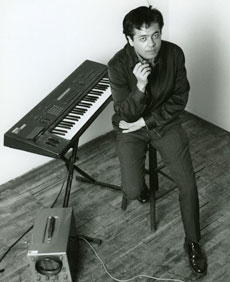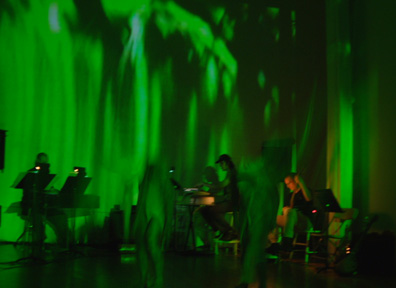 Drum, bass 'n violins I would like to bring to your attention the music of composer George Sarah. George is a Catholic who lives in Los Angeles and since 1985 has regularly been commissioned by film and TV companies to compose scores for their programming. I won’t go through the names, but his portfolio is impressive. He works for household name shows, as his MySpace page reveals. I came across him when I first visited Los Angeles about 4 years ago. A Catholic friend had organized for me to teach an icon painting class at St Monica’s Church in West Hollywood. George just happened to hear about this and keen to help, arranged promotional interviews for community radio and TV. You can see the TV show through the panel, right.
Drum, bass 'n violins I would like to bring to your attention the music of composer George Sarah. George is a Catholic who lives in Los Angeles and since 1985 has regularly been commissioned by film and TV companies to compose scores for their programming. I won’t go through the names, but his portfolio is impressive. He works for household name shows, as his MySpace page reveals. I came across him when I first visited Los Angeles about 4 years ago. A Catholic friend had organized for me to teach an icon painting class at St Monica’s Church in West Hollywood. George just happened to hear about this and keen to help, arranged promotional interviews for community radio and TV. You can see the TV show through the panel, right. The music for the opening sequence is one of George’s pieces. This was filmed before I was recruited by Thomas More College and moved to New Hampshire. He writes music for his separately released CDs (or whatever the latest mode of recording via computer is!) and performs his work in concert.
His style has been described as electronic chamber music. He performs with a traditional string trio, but accompanies them on electronic keyboards and drum machines. It has a haunting quality and a modern feel but, and I think it is more than simply the choice of instruments, it has a sense of traditional form about it as well.
The music for the opening sequence is one of George’s pieces. This was filmed before I was recruited by Thomas More College and moved to New Hampshire. He writes music for his separately released CDs (or whatever the latest mode of recording via computer is!) and performs his work in concert.
His style has been described as electronic chamber music. He performs with a traditional string trio, but accompanies them on electronic keyboards and drum machines. It has a haunting quality and a modern feel but, and I think it is more than simply the choice of instruments, it has a sense of traditional form about it as well.
If we are to evangelise the culture, then it must be rooted in the Mass. For the Mass, it is important that we employ traditional forms that are united to the liturgy. However, once we go out of the church building it is legitimate, I think to develop them into other profane (ie non-sacred) forms that grab people and then direct them towards the Mass. We are required to develop a culture of beauty that both speaks to modern man and opens up the hearts of men to God’s grace. George is consciously seeking to do this by working within the world of popular music.
If asked he will talk freely and enthusiastically about his conversion, which he attributes to Mary; and his desire to draw people into the Church. However, within the context of his music it is through form rather than words that he seeks to do it. He aims for beauty that elevates the souls of men to God. He is self taught and composes by developing melodies on the keyboard and then building the harmony and counterpoint around it instinctively. To my mind George is doing something very important here. While I firmly believe that the most beautiful music is that which is united to the Mass, plainchant and polyphony, not all are attracted to it immediately. It is an adage in all evangelization that you have to meet people where they are and take them to somewhere better. George’s music heard by many who would never hear Palestrina and is quite different structurally, but I do feel that it is nudging their souls in the Palestrina’s direction.
Some argue that pop and good music are a contradiction in terms. Certainly, I would say, much pop music is detrimental to the soul (and intentionally so). But it is not true of all it. What opened me up to classical music (and who knows, the beauty of God and my eventual conversion some years later) was the music of a band in the 1970s who were writing rock music but consciously employing classical, rather than blues based forms. The early music of Genesis (we are talking pre1976 here, for example the track, The Firth of Fifth) was cutting edge and trendy at the time so as a teenage schoolboy I could contemplate listening to it. I would never, ever, have chosen to listen to ‘Christian rock’, which just made me cringe with embarrassment…and it still does. Genesis did not write their music as an evangelical tool at all (none are Christians to my knowledge) but its use of traditional form, with intelligently applied rhythms pulled me in and sent me off in the right direction. I have spoken to a number of people since who have said the same. I doubt that 1970s rock will pull in many today, but the idea is still good, and this is what George is doing in a current idiom. It is interesting that he does not see his music as something that is used the context of the Mass. Firmly orthodox, he loves the Latin Mass and would always want to see the traditional forms of plainchant and polyphony.
George was recently commissioned to write an original score for performance at the Los Angeles Film Festival. He could choose whatever film he wished. He picked the 1920s silent film, The Passion of Joan of Arc. This is accepted in all circles as classic and so there was no hesitation in accepting his choice, even though it has Catholic themes. George just had to write the music and he could let the silent film do the talking! You can see and hear the show on August 7th this summer in LA, details here.




